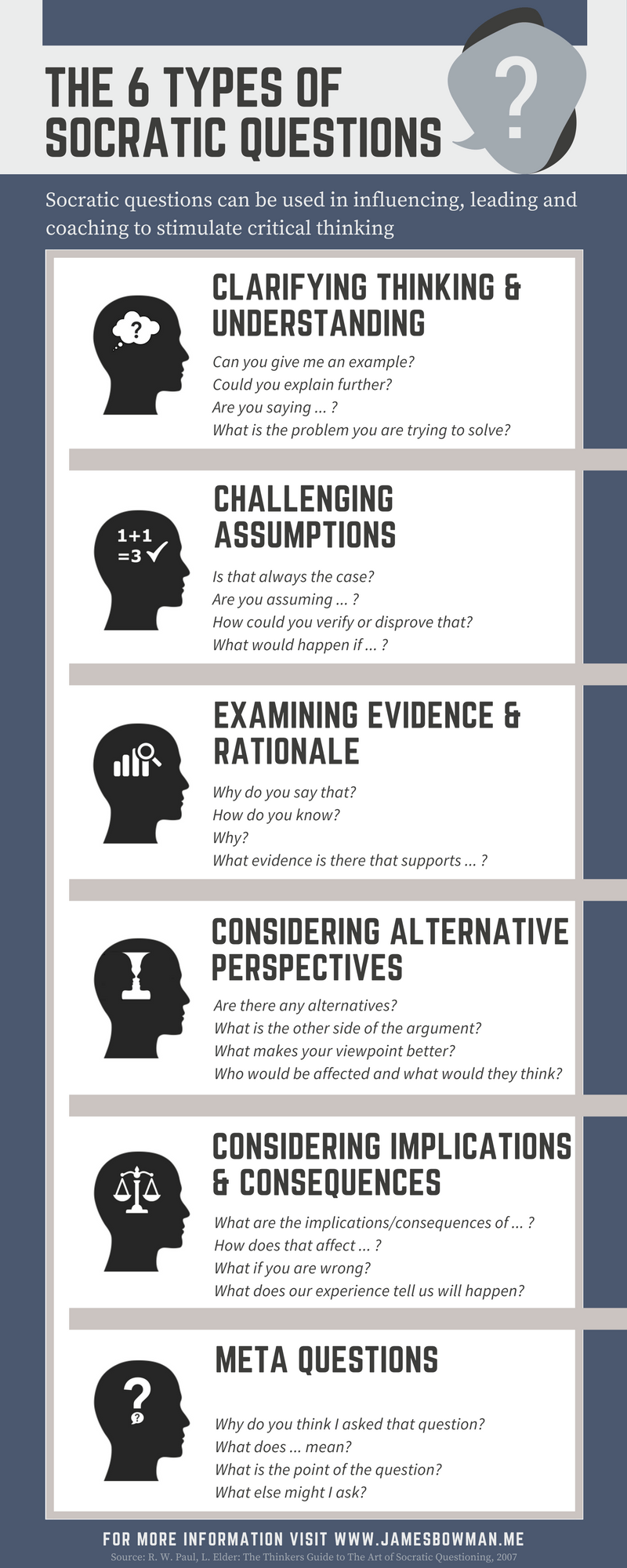Asking questions to better examine an idea is perhaps the most essential tool to not only involve learners but also activate intellectual processes. Memory, recall, comprehension and reflection all take place during a debate or active discussion. Having These activities in the classroom allows for higher order thinking to take place.
An easy way to know if someone has remembered, and importantly learned what it means, is if they can recall the idea and then explain using their own words – bonus points for examples too.
The divide between understanding what we need to do and how something needs to be done is larger than most think. It is clear that asking questions is important; but which ones, and how do you know if the response is correct? The future of deep-learning and intellectual thinking will definitely come from active classes with lots of engagement between students.
In 1993, noted American psychologist and expert on critical thinking R.W. Paul published Critical Thinking: How to Prepare Students for a Rapidly World. In his book, he outlines six types of Socratic Questions that can develop critical thinking in learners. Here are the six categories:
- Questions for Clarification
- Questions that Probe Assumptions
- Questions that Probe Reasons and Evidence
- Questions about Viewpoints and Perspectives
- Questions that Probe Implications and Consequences
- Questions about Questions (Meta-questions)
Naturally, how these categories are used to formulate questions varies according to the subject being discussed. Let us look at some examples and guidelines to better understand each category.
Clarification Questions
A core part of the Socratic Method is clarification through a dialogue. The teacher (or even student) can ask questions like:
- Could you say that in another way?
- Could you share an example?
- Are you able to explain that further?
- What would happen after that?
- Would it be possible to rephrase your statement?
Being able to reformulate the answer to a question shows the speaker understand the point they are trying to make, while simultaneously allowing you, the listener, to see the argument deeper. Other listeners and observers can be further enlightened from this process and would be of great educational help to them in the verification/clarification method.
Probing Questions – Assumptions
During a dialogue the responses that are given are often the result of people’s assumptions, we know this to be true since their reply is spontaneous and a reaction to a statement. In this way asking the speaker to identify their own assumptions to a statement is a technique which can effectively probe for the truth
- Are you assuming that…?
- What would happen if…?
- Why do you believe that…?
- Through what method did you arrive to this statement…?
The restatement/verification technique goes a long way towards establishing a climate where students believe their opinions are not only acceptable, but valued as well.
Probing Questions – Reasons and Evidence
Focusing on follow-up questioning which targets evidence and how to correctly deduce information from that evidence.
- What are your reasons for?
- How did you arrive to that conclusion?
- What can you cite to support your view?
- What evidence do you have to support your conclusion?
- why?
- How do you know why?
- Why do you say that?
If the speaker cannot provide evidence then the questioning needs to focus on how to get this evidence. This is useful as it has the speaker creating ideas from real facts and events, which then gives the speaker value for what they are saying.
Viewpoint and Perspective Questions
Later, it becomes wise to ask for alternatives to the two sides being discussed. This allows for further contradictory points to rise to the surface, and even find two other, perhaps more worthy arguments, which need to be discussed instead.
- What makes your point of view better?
- What is the other side of the argument?
- Are there any alternatives?
- Who would be affected by this?
- How do others see your point of view?
Probing Questions – Implications and Consequences
The speaker will now need to explain the consequences of their argument. As we know that the idea is only value if the results are equally valid.
- What if?
- What then?
- If this is true, what would happen next?
- What id there were not true?
- What would happen then?
- What if you are wrong?
- What does our experience tell us will happen?
Questions about Questions
Most of have the experience of over-hearing a lecture or conversation and then we ask ourselves why did they say that? Well meta-questioning allows a reflective presence to ensure the discussion has asked the right questions and did not just hear the best answers to a problem.
- What else might I ask?
- What did you ask?
- What is the point of your question?
- what does … mean?



Good and cute
I’m impressed with this